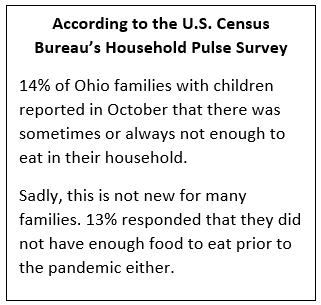 Child Nutrition Reauthorization (CNR) – An Opportunity to End Child Hunger
Child Nutrition Reauthorization (CNR) – An Opportunity to End Child Hunger
March 9, 2021
By Katherine Ungar, JD, Policy Associate
There has never been a greater need to strengthen our federal child nutrition policies and programs than now. The Covid-19 pandemic has resulted in overwhelming and unprecedented levels of child hunger across our nation. Consequences of child hunger go beyond not having enough food. Children’s physical and mental health depend on them receiving enough nutrients each day. As discussed here, malnutrition undermines a child’s ability to flourish and reach their full learning potential.
Thanks to federal programs, millions of children benefit from the school nutrition programs authorized by the federal government. Federal nutrition programs play a critical role in helping to reduce child hunger and must be strengthened to meet the needs of all children. These programs touch millions of children each day and lead to improved child well-being.
Approximately every five years, Congress is tasked with reviewing and making changes to the laws that govern our federal nutrition programs (primarily, the Richard B. Russell National School Lunch Act, the Child Nutrition Act of 1966, and Section 32 of the Act of August 24, 1935) through the child nutrition reauthorization (CNR) process. The most recent CNR was the Healthy, Hunger-Free Kids Act of 2010, though some of the authorities provided in the Act expired on September 30, 2015. However, most nutrition programs continue to operate through Congress’s continued funding provided by appropriations acts. This allows programs to continue despite the reauthorization delay. Significantly and among other things, the Healthy, Hunger-Free Kids Act created the Community Eligibility Provision, an option within the National School Lunch Program and School Breakfast Program that allowed certain eligible schools to provide free meals to all students. The law also required USDA to update nutrition standards for school meals.
students. The law also required USDA to update nutrition standards for school meals.
Among other programs, the following integral nutrition programs are up for review through CNR: the School Breakfast Program, the National School Lunch Program, the Child and Adult Care Food Program, the Summer Food Service Program, The Afterschool Meal Program, The Special Supplemental Nutrition Program for Women, Infants, and Children (WIC), and the Fresh Fruit and Vegetable Program.
Through the reauthorization process, congress has the opportunity to revisit and strengthen the laws that authorize these programs to help ensure more children, schools and communities can access nourishing foods.
Through CNR, Congress can Expand Federal Programs to Alleviate Child Hunger
A robust CNR bill will increase access by addressing barriers to food access currently faced by so many of our children. Policies that streamline program rules between summer and afterschool meals, expand and permanently authorize the Summer EBT to allow families a grocery credit during the summer months, and provide flexibilities that allow summer meal providers to reach more kids, including those in hard to reach areas, would help alleviate child hunger.
Congress also has the opportunity (and the responsibility), through CNR, to expand the national school lunch program so that all students are eligible to receive meals at school at no cost. School meals for all would allow every child, regardless of their family’s income, enrolled in a school that operates the National School Lunch Program or School Breakfast Program to receive free breakfast and free lunch. Not only would this alleviate the administrative burdens on both families and schools to apply for and verify eligibility, but it also eliminates the stigma and shame felt by some students who access the program. Importantly, school meals for all ensures all children have access to at least two nutritious meals a day. Studies and common sense continue to demonstrate that hungry children cannot meet their learning potentials. School meals are a key ingredient to student success.
Currently, due to the pandemic, all students are temporarily eligible for free school meals during the 2020-2021 school year, a change that should be made permanent. Child hunger existed before the pandemic and it will continue to exist after the pandemic until we make changes to our child nutrition laws and programs. Free school meals for all is not a radical idea. In fact, other countries such as Finland and Sweden provide school meals for all students. School meals for all is a critical step to ending child hunger in this country.
CDF-Ohio will continue to monitor and publish blog posts around CNR and opportunities to strengthen child nutrition programs.

